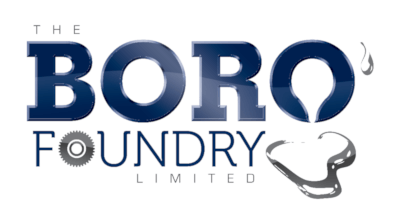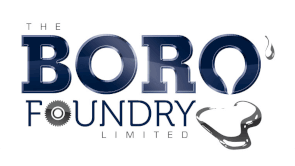Ductile Iron Casting Grades – Specifications to EN 1563
Boro Foundry manufactures high-performance ductile iron castings across a full range of EN-GJS grades, in line with the EN 1563 standard. Known for their superior strength, toughness, and fatigue resistance, our ductile iron components are suited to demanding mechanical and structural applications. We produce castings up to 1.7 tonnes, with rigorous control over composition, nodularity, and microstructure. Whether your requirements call for high elongation, impact resistance, or elevated strength, we offer material grades that meet both standard and bespoke specifications.
Mechanical Properties
The mechanical performance of our ductile iron grades is achieved through precise control of nodularity, matrix structure, and alloy content. The table below outlines tensile strength, 0.2% proof stress, elongation, and typical microstructure for each EN-GJS grade — helping engineers and specifiers select the right material for applications requiring strength, ductility, and fatigue resistance.
| Grade | Standard | Equivalents (Standard / Grade) | Tensile N/mm₂ | 0.2% Proof Stress N/mm₂ | Elongation % | Structure |
|---|---|---|---|---|---|---|
| BS EN-GJS-350-22-LT | BS EN 1563 |
| 350 | 220 | 22 | Ferrite |
| BS EN-GJS-350-22-RT | BS EN 1563 |
| 350 | 220 | 22 | Ferrite |
| BS EN-GJS-350-22 | BS EN 1563 |
| 350 | 220 | 22 | Ferrite |
| BS EN-GJS-400-18-LT | BS EN 1563 |
| 400 | 240 | 18 | Ferrite |
| BS EN-GJS-400-18-RT | BS EN 1563 |
| 400 | 240 | 18 | Ferrite |
| BS EN-GJS-400-18 | BS EN 1563 |
| 400 | 240 | 18 | Ferrite |
| BS EN-GJS-400-15 | BS EN 1563 |
| 400 | 240 | 15 | Ferrite |
| BS EN-GJS-450-10 | BS EN 1563 |
| 450 | 310 | 10 | Ferrite |
| BS EN-GJS-500-7 | BS EN 1563 |
| 500 | 320 | 7 | Ferrite – Pearlite |
| BS EN-GJS-600-3 | BS EN 1563 |
| 600 | 370 | 3 | Pearlite – Ferrite |
| BS EN-GJS-700-2 | BS EN 1563 |
| 700 | 420 | 2 | Pearlite |
| BS EN-GJS-800-2 | BS EN 1563 | - | 800 | 480 | 2 | Pearlite |
| BS EN-GJS-900-2 | BS EN 1563 | - | 900 | 600 | 2 | Pearlite or Tempered Martensite |
International Specification Equivalents to EN 1563:1997
The table below provides international equivalents to EN 1563 ductile iron designations, based on comparable material specifications from British, European, and international standards. Mechanical properties are referenced as measured on separately cast test bars, in accordance with standard practice.
| Material Designation EN 1563 |
UK
BS 2789 1985 |
Germany
DIN 1693 1973 |
Netherlands
NEN 6002-D 1966 |
Italy
UNI 4544 1979 |
Sweden
SS 1407 1981 |
USA
ASTM A536 1993 |
international
ISO 1083 1987 |
|
|---|---|---|---|---|---|---|---|---|
| Symbol | Number | |||||||
| EN-GJS 350-22 | EN JS1010 | 350-22 | 350-22 | |||||
| EN-GJS 350-22LT | EN JS1015 | 350-22L40 | GGG 35.3 | GN 38 | GS 370-17 | 17-15 | 350-22L | |
| EN-GJS 400-18 | EN JS1020 | 400-18 | GN 42 | 60-40-18 | 400-18 | |||
| EN-GJS 400-18LT | EN JS1025 | 100-18L20 | GGG 40.3 | 17-02 | 400-18L | |||
| EN-GJS 400-15 | EN JS1030 | 420-12 | GGG 40 | GS 400-12 | 17-00 | 65-45-12 | 400-15 | |
| EN-GJS 450-10 | EN JS1040 | 450-10 | 70-50-05 | 450-10 | ||||
| EN-GJS 500-7 | EN JS1050 | 500-7 | GGG 50 | GN50 | GS 500-7 | 27-02 | 80-55-06 | 500-7 |
| EN-GJS 600-3 | EN JS1060 | 600-3 | GGG 60 | GN60 | GS 600-3 | 32-03 | 100-70-03 | 600-3 |
| EN-GJS 700-2 | EN JS1070 | 700-2 | GGG 70 | GN70 | GS 700-2 | 37-01 | 700-2 | |
| EN-GJS 800-2 | EN JS1080 | 800-2 | GGG 80 | GN80 | GS 800-2 | 120-90-02 | 800-2 | |
| EN-GJS 900-2 | EN JS1090 | 900-2 | 900-2 | |||||
FREQUENTLY ASKED QUESTIONS
What ductile iron grades do you supply?
We offer a comprehensive range of EN-GJS grades in accordance with EN 1563, including EN-GJS-350-22 through EN-GJS-900-2. These cover varying combinations of strength, elongation, and microstructure to suit a wide range of industrial applications.
Are your ductile iron castings made to EN 1563 specifications?
Yes. All our ductile iron grades conform to the EN 1563 standard, with mechanical properties and nodular graphite structure verified for full compliance.
What is the maximum casting weight you can produce in ductile iron?
We can produce ductile iron castings up to 5.5 tonnes, depending on the complexity of the design and grade selected.
Can you help me choose the right ductile iron grade?
Certainly. We provide expert guidance to help you select a grade based on your application’s mechanical demands, such as ductility, fatigue resistance, or wear performance.
How do you ensure quality in your ductile iron castings?
We apply strict metallurgical controls, including nodularity checks, matrix verification, and mechanical testing. Every casting is assessed to ensure it meets both standard requirements and customer specifications.

